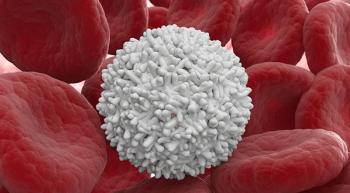
The American Society for Radiation Oncology released an updated guideline which states that some patients with incurable non-small cell lung cancer should receive concurrent chemotherapy along with palliative thoracic radiation therapy.

The American Society for Radiation Oncology released an updated guideline which states that some patients with incurable non-small cell lung cancer should receive concurrent chemotherapy along with palliative thoracic radiation therapy.

The surgical landscape for non-small cell lung cancer is shifting now that durvalumab (Imfinzi), the first immunotherapy for stage III NSCLC, has been approved for the FDA.

The Pivot Nurse in Oncology (PNO) role appears to make a substantial difference in care for patients being treated for advanced lung cancer, according to a study presented at the European Lung Cancer Congress (ELCC) 2018.

The FDA has granted a priority review to duvelisib for a full approval for the treatment of patients with relapsed/refractory chronic lymphocytic leukemia/small lymphocytic lymphoma (CLL/SLL) and an accelerated approval for the treatment of patients with relapsed/refractory follicular lymphoma.

The American Society of Clinical Oncology released guidelines on management of immune-related adverse effects in patients treated with immune checkpoint inhibitor therapy.

The FDA has granted a priority review designation to dacomitinib for the frontline treatment of patients with EGFR-positive locally advanced or metastatic non–small cell lung cancer (NSCLC), according to Pfizer, the manufacturer of the pan-human EGFR tyrosine kinase inhibitor (TKI).

The Food and Drug Administration (FDA) approved Rubraca (rucaparib) as a maintenance therapy for women with recurrent epithelial ovarian, fallopian tube or primary peritoneal cancer who are in complete or partial response to platinum-based chemotherapy, according to Clovis Oncology, the company that manufactures the drug.

The FDA has granted a priority review to moxetumomab pasudotox for the treatment of adult patients with hairy cell leukemia (HCL) who have received at least 2 prior lines of therapy, according to AstraZeneca (MedImmune), the developer of the anti-CD22 recombinant immunotoxin.

Patients with stage III colon cancer who ate at least 2 servings of nuts per week had superior disease-free survival (DFS) and overall survival (OS), according to results from the CALGB 8903 study published in the Journal of Clinical Oncology.

The combination of eflornithine (alphadifluoromethylornithine) and lomustine is currently being explored as a treatment for patients with recurrent anaplastic astrocytoma (AA).

From diagnosis to post-treatment, survivors should have access to resources that help them navigate through their cancer journey.

New research indicates that both a dependence on glycolysis and prior chemotherapy appear to reduce the potential for T cells to develop into chimeric antigen receptor (CAR) T-cell therapy.

Behavioral counseling interventions are of moderate benefit in increasing sun protection behaviors in children, adolescents, and young adults with fair skin types.

What are some things we can do to steer our patients away from bad information?

Despite initial thoughts that patients would be dissatisfied, a new “ultra-restrictive” opioid prescription protocol for gynecologic surgery led to an 89% reduction in the number of opioid tablets dispensed and a high rate of patient satisfaction.

A filgrastim (Neupogen) biosimilar, EP2006, recently produced safety results equivalent to those observed with referent filgrastim in a combined analysis of 2 phase III breast cancer studies from the United States and Europe.

The FDA has granted blinatumomab (Blincyto) an accelerated approval for the treatment of adult and pediatric patients with B-cell precursor acute lymphoblastic leukemia (ALL) who are in remission but still have minimal residual disease (MRD).

The FDA has granted a breakthrough therapy designation to enfortumab vedotin to treat patients with locally advanced or metastatic urothelial cancer who previously received immune checkpoint therapy.

The National Comprehensive Cancer Network (NCCN) has added the combination of TTFields (Optune) and temozolomide (Temodar) to its Clinical Practice Guidelines in Oncology for Central Nervous System Cancers for Category 1 treatment of newly diagnosed glioblastoma multiforme following maximal safe resection and completion of radiation therapy.

The FDA has granted a priority review to the combination of nivolumab (Opdivo) and ipilimumab (Yervoy) for the treatment of adult patients with microsatellite instability-high (MSI-H) or mismatch repair deficient (dMMR) metastatic colorectal cancer (mCRC) following progression on a fluoropyrimidine, oxaliplatin, and irinotecan.

Emergency department (ED) visits are more common among older adults with diabetes. Oncology nurses need to be alert to patients with cancer who also have diabetes, and make sure they have the information they need to prevent unnecessary ED visits.

Survivors of childhood cancer often suffer from long-term physical and cognitive impairments that could affect their ability to secure or keep a job.

Nilotinib (Tasigna) was approved by the FDA for the first- and second-line treatment of pediatric patients aged 1 year and older with Philadelphia chromosome–positive chronic myeloid leukemia in the chronic phase (Ph+ CML-CP).

Nurses should be aware of the phenomenon of breast implant-associated anaplastic large cell lymphoma.

Therapeutic strategies for treating less-common molecular targets found in non–small cell lung cancer (NSCLC), such as ROS1, NTRK, MET, and HER2, are under development.

The FDA has approved brentuximab vedotin (Adcetris) for use as a frontline treatment, in combination with chemotherapy, for adult patients with stage III or IV classical Hodgkin lymphoma.

While the new FDA approval of 4-week dosing adds more flexibility in scheduling, it reduces the number of times patients would be monitored in person for adverse effects (AEs), so nurses need to be alert to and educated about potential AEs.

The FDA has granted a priority review to a supplemental new drug application for enzalutamide (Xtandi) for the treatment of men with nonmetastatic castration-resistant prostate cancer (CRPC).

The Centers for Medicare & Medicaid Services (CMS) has announced that it will cover certain genomic testing for Medicare-eligible patients with advanced cancer.

A group of researchers in the northeast United States conducted a study to explore how women become informed about breast cancer surgery options.